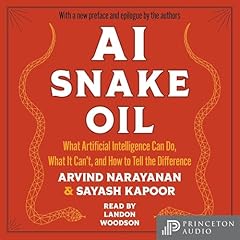
The Most Human Human
What Talking with Computers Teaches Us About What It Means to Be Alive
Failed to add items
Sorry, we are unable to add the item because your shopping cart is already at capacity.
Add to Cart failed.
Please try again later
Add to Wish List failed.
Please try again later
Remove from wishlist failed.
Please try again later
Adding to library failed
Please try again
Follow podcast failed
Please try again
Unfollow podcast failed
Please try again
 Prime members: New to Audible?
Prime members: New to Audible?Get 2 free audiobooks during trial.
Pick 1 audiobook a month from our unmatched collection.
Unlimited access to our all-you-can listen catalog of 150K+ audiobooks and podcasts.
Access exclusive sales and deals.
Premium Plus auto-renews for $14.95/mo after 30 days. Cancel anytime.
Buy for $18.00
-
Narrated by:
-
Brian Christian
-
By:
-
Brian Christian
Named for computer pioneer Alan Turing, the Turing Test convenes a panel of judges who pose questions—ranging anywhere from celebrity gossip to moral conundrums—to hidden contestants in an attempt to discern which is human and which is a computer. The machine that most often fools the panel wins the Most Human Computer Award. But there is also a prize, bizarre and intriguing, for the Most Human Human.
In 2008, the top AI program came short of passing the Turing Test by just one astonishing vote. In 2009, Brian Christian was chosen to participate, and he set out to make sure Homo sapiens would prevail.
The author’s quest to be deemed more human than a computer opens a window onto our own nature. Interweaving modern phenomena like customer service “chatbots” and men using programmed dialogue to pick up women in bars with insights from fields as diverse as chess, psychiatry, and the law, Brian Christian examines the philosophical, biological, and moral issues raised by the Turing Test.
One central definition of human has been “a being that could reason.” If computers can reason, what does that mean for the special place we reserve for humanity?
Listeners also enjoyed...




















People who viewed this also viewed...


















Interesting
Something went wrong. Please try again in a few minutes.
What did you like best about The Most Human Human? What did you like least?
I come from more of a technical background in regards to AI, and found a more philosophical treatise on man vs machine refreshing. Many of my personal interests (computer chess, neural networks, the singularity, speculation on the soul) crossed here, which was thoroughly enjoyable. I did find some of the conclusions to be a bit self aggrandizing of the liberal arts, which unfortunately tainted my views on many of his arguments.Were the concepts of this book easy to follow, or were they too technical?
The writer is extremely precise with his choice in language, which is not surprising given his background in poetry, and his philosophical arguments were well laid out. From a technical perspective, this book targets a more lay audience, and thus was not difficult to follow.Did Brian Christian do a good job differentiating all the characters? How?
It wasn't a book that really had characters other than the author himself.Any additional comments?
It read a little slow at times, and tended to drift towards the end. It was interesting, but not a page turner by any means.wandering speculation on what makes humans human
Something went wrong. Please try again in a few minutes.
You don't have to be a computer science fan to deeply appreciate this book. However, I suppose reading this book would mKe you more likely to become interested in computer science.
Make no mistake, this is a philosophy book at its core gift-wrapped in technological history.
Tremendous job Brian; you are a great human confederate after all.
FYI- I would love to recommend this book to my 8 & 10yr old sons. But, some content and language are not appropriate for their ages. I am a sad that I cannot share it with them yet.
Another great work from the author
Something went wrong. Please try again in a few minutes.
Aside from that, the reading seemed to suit the writing perfectly. I think that it was read by the author, in which case he made an excellent choice doing so himself.
Well Written, Well Read
Something went wrong. Please try again in a few minutes.
Write tells a good story beyond his Turing Test
Something went wrong. Please try again in a few minutes.


